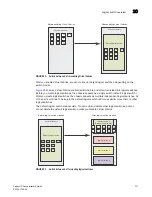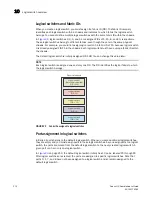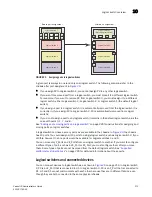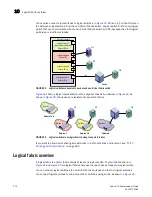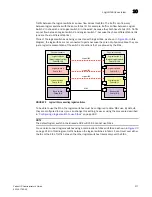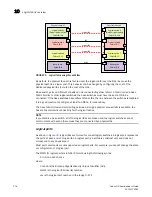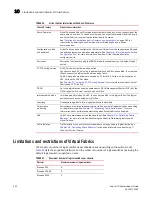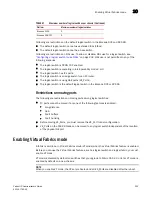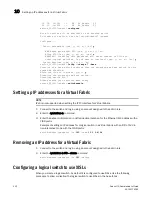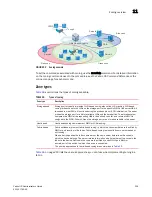
Fabric OS Administrator’s Guide
225
53-1001763-02
Configuring logical switches to use basic configuration values
10
Example
The following example checks whether VF mode is enabled or disabled and then disables it.
switchA:FID128:admin>
fosconfig --show
FC Routing service:
disabled
iSCSI service:
Service not supported on this Platform
iSNS client service:
Service not supported on this Platform
Virtual Fabric:
enabled
switch:admin>
fosconfig --disable vf
WARNING:
This is a disruptive operation that requires a reboot to take
effect.
Would you like to continue [Y/N]
y
Configuring logical switches to use basic configuration values
All switches in the fabric are configured to use the same basic configuration values. When you
create logical switches, the logical switches might have different configuration values than the
default logical switch. Use the following procedure to ensure that newly created logical switches
have the same basic configuration values as the default logical switch.
NOTE
For most users, you do not need to run this procedure. Contact your switch service provider to
determine if you need to use this procedure.
You need to run this procedure only once on each chassis, after you enable Virtual Fabrics but
before you create logical switches. The configuration settings are then preserved across reboots
and firmware upgrades and downgrades.
1. Connect to the physical chassis and log in using an account assigned to the admin role with
the chassis-role permission.
2. Enter the following command to ensure that newly created logical switches have the same
basic configuration values as the default logical switch.
configurechassis
3. Enter n at the prompts to configure system and cfgload attributes. Enter y at the prompt to
configure custom attributes.
System (yes, y, no, n): [no]
n
cfgload attributes (yes, y, no, n): [no]
n
Custom attributes (yes, y, no, n): [no]
y
4. Enter the appropriate value at the Config Index prompt. Contact your switch service provider to
determine the appropriate value.
Config Index (0 to ignore): (0..1000) [3]:
Creating a logical switch or base switch
When the logical switch is created, it is automatically enabled and is empty—that is, it does not
have any ports. After creating the logical switch, you must disable the switch to configure it and set
the domain ID. Then you assign ports to the logical switch.
Summary of Contents for 53-1001763-02
Page 1: ...53 1001763 02 13 September 2010 Fabric OS Administrator s Guide Supporting Fabric OS v6 4 0 ...
Page 4: ...iv Fabric OS Administrator s Guide 53 1001763 02 ...
Page 24: ...xxiv Fabric OS Administrator s Guide 53 1001763 02 ...
Page 28: ...xxviii Fabric OS Administrator s Guide 53 1001763 02 ...
Page 32: ...xxxii Fabric OS Administrator s Guide 53 1001763 02 ...
Page 40: ...xl Fabric OS Administrator s Guide 53 1001763 02 ...
Page 42: ...2 Fabric OS Administrator s Guide 53 1001763 02 ...
Page 54: ...14 Fabric OS Administrator s Guide 53 1001763 02 High availability of daemon processes 1 ...
Page 74: ...34 Fabric OS Administrator s Guide 53 1001763 02 Basic connections 2 ...
Page 102: ...62 Fabric OS Administrator s Guide 53 1001763 02 Audit log configuration 3 ...
Page 214: ...174 Fabric OS Administrator s Guide 53 1001763 02 Management interface security 7 ...
Page 228: ...188 Fabric OS Administrator s Guide 53 1001763 02 Brocade configuration form 8 ...
Page 276: ...236 Fabric OS Administrator s Guide 53 1001763 02 Creating a logical fabric using XISLs 10 ...
Page 404: ...364 Fabric OS Administrator s Guide 53 1001763 02 ...
Page 440: ...400 Fabric OS Administrator s Guide 53 1001763 02 Performance data collection 17 ...
Page 480: ...440 Fabric OS Administrator s Guide 53 1001763 02 F_Port masterless trunking 19 ...
Page 494: ...454 Fabric OS Administrator s Guide 53 1001763 02 Buffer credit recovery 20 ...
Page 574: ...534 Fabric OS Administrator s Guide 53 1001763 02 Hexadecimal overview E ...

